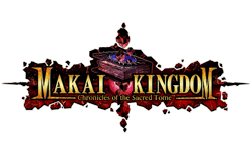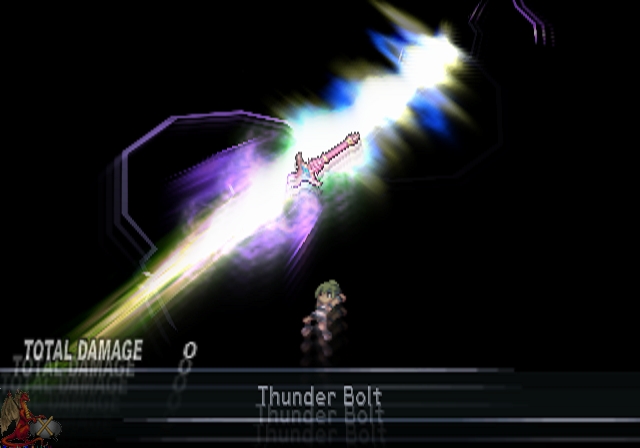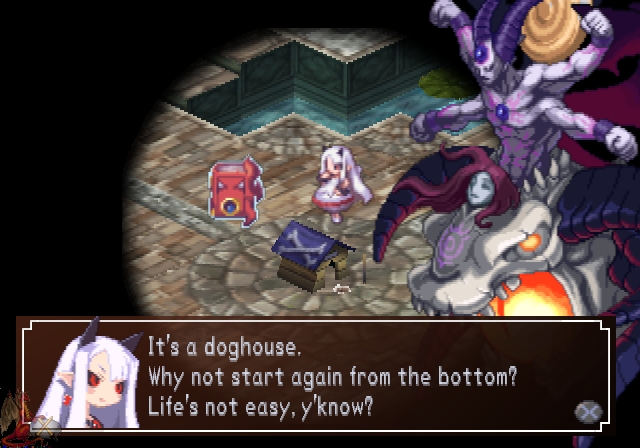|
|

|
BATTLE SYSTEM
|

|
INTERACTION
|

|
ORIGINALITY
|

|
STORY
|

|
MUSIC & SOUND
|

|
VISUALS
|

|
CHALLENGE
|
Easy
|
COMPLETION TIME
|
17-75 Hours
|
|
OVERALL
3.0/5
|
Rating definitions
|
|
|
After the Oracle Pram foretells the fall of Lord Zetta's Netherworld, the mighty Overlord goes on a quest to protect it. Unfortunately for him, it turns out to be a self-fulfilling prophecy and his efforts to save it end up dooming it instead. In order to protect his world from complete destruction, he confines his soul to the sacred tome, a book with great power. In order to restore his Netherworld to its former glory, he must conquer several lesser Netherworlds. Makai Kingdom combines elements from Disgaea and Phantom Brave into one package in order to create an interesting hybrid.
The greatest combination of Makai Kingdom's last two predecessors can be seen in the battle system. Phantom Brave's gridless battlefields and cylindrical/spherical area effect skills have been mixed with a small variation of Disgaea's class system and ability to have a character be reborn. Of course, these systems have been built on to a degree: the gridless system is much less buggy than it was before, and the ability to be reborn in a new body has a few new twists thanks to the addition of a wish making system. Wishes vary from changing the main character to unlocking secret boss fights. Some powerful wishes can be deadly, but it's possible to move the soul of those who have died into a new body and accumulate bonus points by doing so. It's also still possible to customize a character by using the confine system to bond them to an object such as a tree or rock, but they no longer vanish from the battlefield after a few turns, so statistic boosting spells are actually useful this time around.
 Thunder Power
Thunder Power
|
|
In addition to the gridless system and greater character customization, there are a few other changes to liven up battles. Facilities, such as castles and doghouses, allow quick and easy movement and the invitation of characters, but also add bonuses to characters that are already supported by them. It's even possible to raid enemy facilities from the inside in order to take out several enemy troops at once. Another interesting addition is the ability to pilot machines that vary from drill tanks to giant mechs. These additions are quite original, despite the fact that they borrow a lot from other NIS games.
If that isn't enough, the AI is a bit better than it used to be, but it still has a few problems. While the battle system and AI have become much more refined, the battle system itself is still hurt by the fact that only a few of the battlefields are actually designed with tactics in mind. Much of the game is spent playing through random fields that simply involve mindlessly killing everything in sight.
Randomly generated missions are very easy, but the pre-generated ones are marginally more difficult. Bascially, players can win battles without excessive leveling, yet lose them if they aren't at least adequately prepared. Overall, Makai Kingdom is still a pretty easy game, even with the slight boost in AI.
While much of the battle system has been improved upon, one area that has been left behind is the interface. While there aren't any problems with spells, the targeting system for certain long range weapon skills requires very careful positioning of characters and can often be more work than they're worth. Out of battle, there are many convenient ways of organizing characters and equipment, but weapons and armor are both classified in the same category, so players must repeatedly sort by attack and by defense in order to equip the optimal equipment. While these problems are minor and the rest of the interface is pretty good, they can still be annoying at times.
 Lord Zetta's mighty doghouse fortress
Lord Zetta's mighty doghouse fortress
|
|
The game's focus is clearly on the battle system, but the storyline has been neglected far more severely than in its predecessors. There are only nine chapters and it is common to go through several battles in a row without any story whatsoever. It isn't until late in the game that the story becomes much more than moving from one lesser Netherworld to another with only minor plot points between chapters.
With only nine chapters, it should come as little surprise that Makai Kingdom is much shorter than those that came before it. The main storyline can be comfortably finished in as little as seventeen hours. Of course, there is plenty of bonus material for those who want to level up a lot and unlock secret boss fights. It also has a new game+ feature for added replay value.
As with its elders, Makai Kingdom uses sprites as opposed to 3D models. In general, these small sprites aren't very impressive, but there are a few large, well-animated sprites here and there, such as Lord Zetta's overlord form. While they don't compare to some of the better 3D games out there, they are still good enough to make the game look decent. There are also static pieces of artwork that appear from time to time. They are rare, but are a nice bonus.
The music doesn't particularly stand out, aside from a few boss stage tracks, but it isn't bad either. The only real problem the music has is that the random battlefields are often accompanied by equally monotonous music.
While it does improve on many of the systems of its predecessor's, the abundance of randomly generated battlefields and the weak storyline hold Makai Kingdom back. It is better than Phantom Brave, but it fails to surpass Disgaea in most aspects. There are some good battles here and there, but there isn't anything particularly special about Makai Kingdom's overall performance.
Review Archives
|









